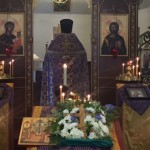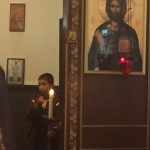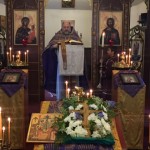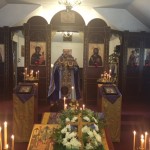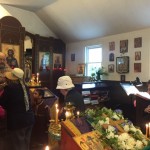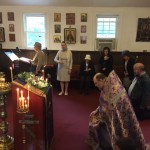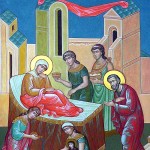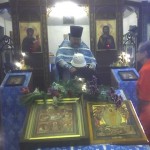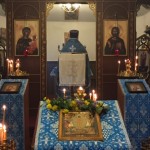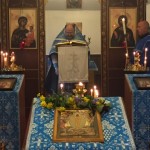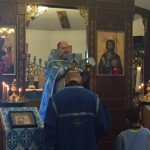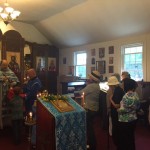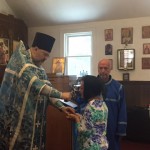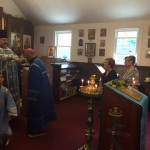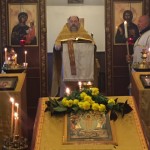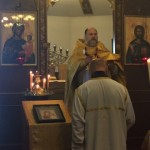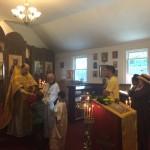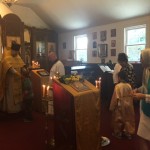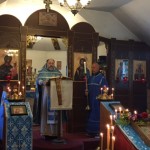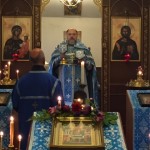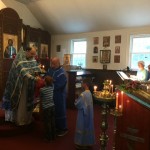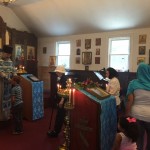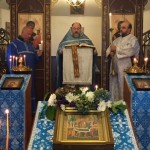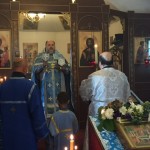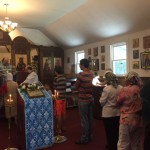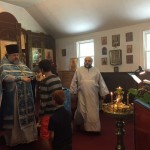On September 27th, on the feast of the Exaltation of the Precious and Life-giving Cross, we had a solemn celebration at our temple. Before the Hours St. George’s Rector, Archpriest Igor Tarasov placed the cross in the middle of the church and venerated it.
At the Divine Liturgy, after the Gospel lesson Fr. Igor preached a homily:
“Today we celebrate the Lord’s holy day dedicated not to some event in the life of Christ but to His Holy Cross. We celebrate Universal Exaltation of the Precious and Life-giving Cross of the Lord. Three centuries after our Lord was crucified, the Cross of Christ was discovered by the pious Christian people and following the order of the Holy Empress Helen. After being found on the Calvary in Jerusalem the Cross was exalted, elevated before the multitude of people by Archbishop Macarius. He exalted the Cross and blessed the people and the multitudes many times exclaimed the petition, “Lord, have mercy!” (“Kyrie eleison”). Today’s feast was established to remember that event and to honor the Holy Cross.”
“Celebrating this feast we may, first of all, reflect upon the great sacrifice our Lord Jesus Christ offered for us on the Cross. The Cross being a tool of shameful execution and horrible death, now became a tool of glorious salvation and new life for the human kind. This is why our pious hymns sung for this holy day call the Cross “the door of paradise”, “the invincible weapon”, “the haven of salvation” and “the resurrection of all the dead”. Without the Holy Cross our salvation could not happen because the Lord in His merciful Providence willed to redeem us by His own death on that holy tool.”
“Dear brothers and sisters! Honoring the Holy Cross we should also remember that the sign of the Cross and its precious image should be with us all the days of our life. Once we are born, the Cross should bless us in the holy rites of the Church, especially in the Mysteries of Baptism and Chrismation. When we live and grow up, we have to learn how to bless ourselves with that sign; how to perform that sign appropriately and rightly, without haste and neglect, but with piety and awareness. Making a sign of the Cross is essential in the life of an Orthodox Christian, so it accompanies us all our life as the Cross itself does. The Cross is everywhere in our religious and spiritual life: on the domes of the holy temples, in the churches and in our homes. The pastors bless the people and pious parents bless their children with that sign. And, finally, when we die the Church blesses our remains and our tomb with the cross and a cross is being placed over our grave. But we believe that if we live by the Cross, there will be no death: the Holy Cross will open to us the doors of paradise, the same way as the priest opens the temple doors with the cross on the early morning of Pascha.”
“However, in order to open for us the doors of eternal life the Cross of Christ has to be really honored. We have to live by the Cross. We have to follow the crucified Christ and to accept our own crosses. We should not forget the words of Christ, “If any man will come after Me, let him deny himself, and take up his cross, and follow Me” (Mt. 16, 24) “And he that takes not his cross, and follows after Me, is not worthy of Me” (Mt. 10, 38). Life is carrying the Cross. Many of us desire to free themselves from the cross, to live a life of pleasure and well being, but such people forget or do not know that such freedom from the cross is a true slavery to sin and passion. Such freedom is finally a warrant for our eternal death. Our modern society is very much after that kind of freedom. And we Christians should beware of that.”
“To live by the cross also means to confess Christ the Crucified. Let us not forget the other words of the Lord: “Whoever… shall be ashamed of Me and of My words in this adulterous and sinful generation; of him also shall the Son of Man be ashamed, when He comes in the glory of His Father with the holy Angels” (Mk. 8, 38). Let us not be ashamed to declare our faith in Christ before the world. Let us not be ashamed to make the sign of the Cross in public. Let us not be ashamed and afraid to call the wrong by its name, to call the sin ‘sin’ and to call the evil ‘evil’! Jesus expects that from us. Nowadays even some so-called Christians avoid doing that.”
“Two days ago the pope of Rome came to visit our country. He spoke several times before the multitudes and he never, never mentioned that America did wrong when it legalized same-sex marriage. Instead, he just repeated our important but trivial words, “God bless America!” Yes, we need God’s blessings, but we cannot believe that God blesses all our wrongs and iniquities. And we could expect more profound statements from the person who claims to be the leader of universal Christianity. And later, when the pope began his sermon in St. Patrick’s Cathedral in New York, he said that his sentiments are now with his “Islamic brothers” celebrating their holiday and suffered a tragedy in Mecca. What about the sentiments with real brothers and sisters in Christ? What about the sentiments with Christians who are now suffering new martyrdom and horrible persecutions from the extreme Muslims in Syria and Iraq? Their churches are being destroyed, the icons are being desecrated, and the holy crosses from the temple domes are being thrown off! They themselves are being tortured and murdered by evil extremists in the name of Islam. What about those Christians, and not those whom the pope called his “brothers”?”
“Dear Orthodox Christians! Let us not be led astray and become like those who forget the truth. Dear true brothers and sisters in Christ! Let us today and always honor the Holy Cross! Let us worship Jesus Christ the Crucified, and let us not be ashamed of Him and of His words. Let us also take up our own crosses and follow Him. Let us follow Him with the Cross, so the Cross may open for us the doors to eternal life!”
Following the end of the Liturgy the Rector performed the rite of Glorification before the Cross and the icon of the feast singing the troparion, kontakion and magnification of the Exaltation. After that the Rector and parishioners venerated the Cross.

